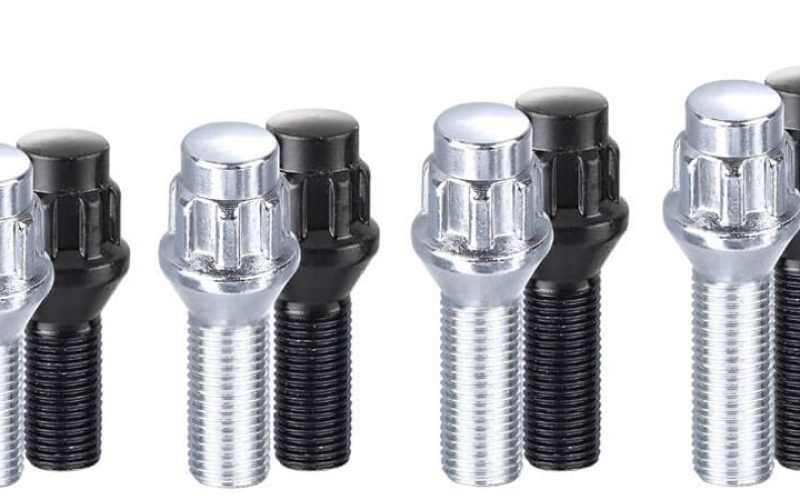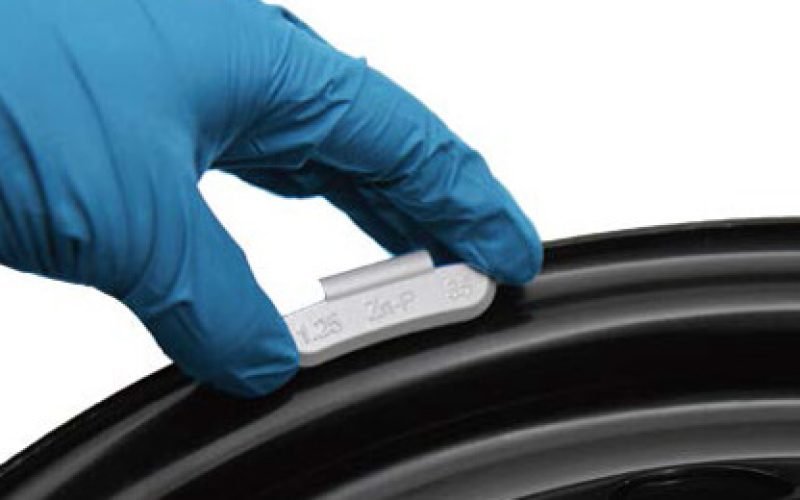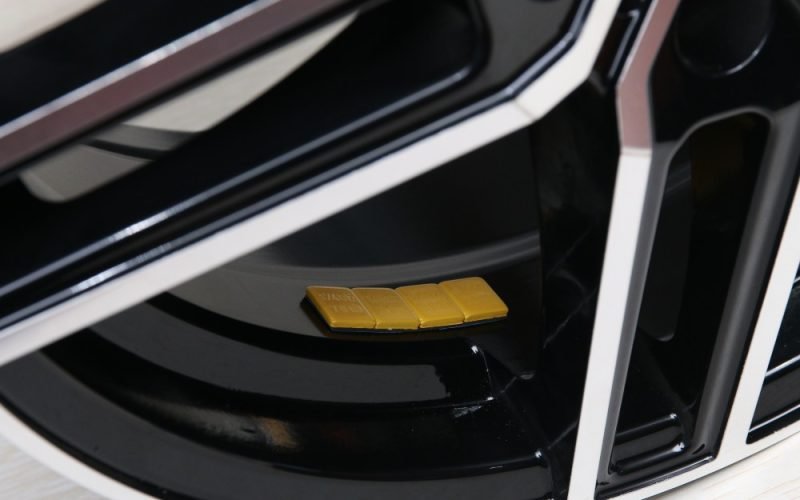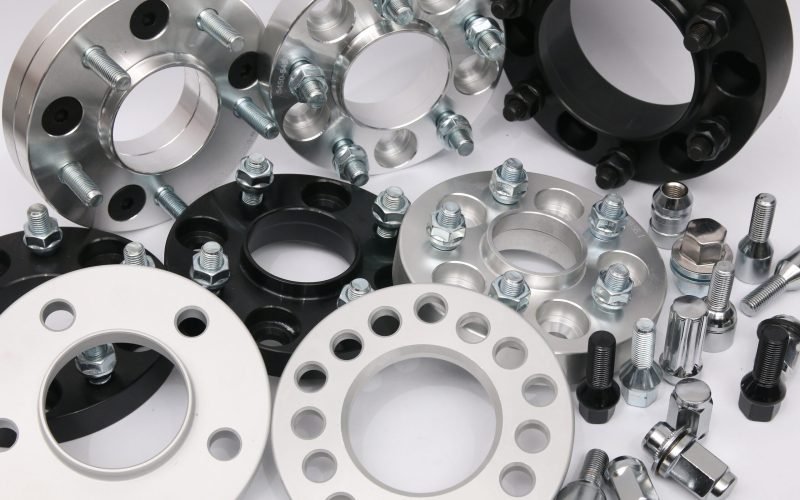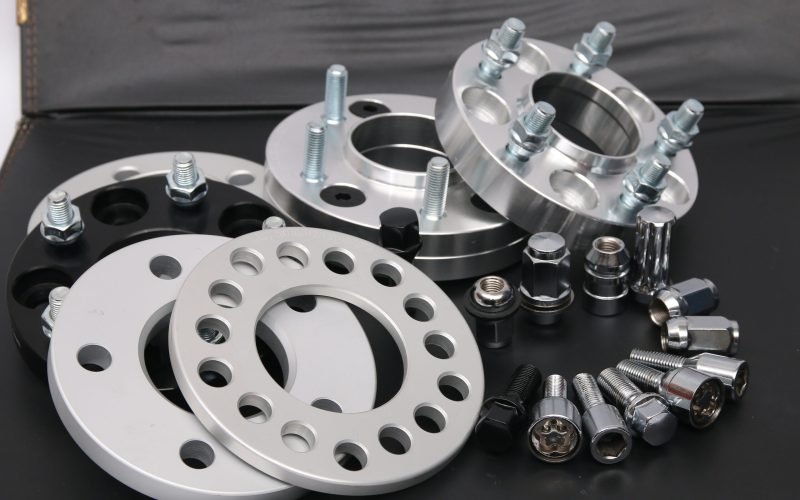

admin1
May 9, 2025
Steel Wheel Weights Advantages Over Other Wheel Materials
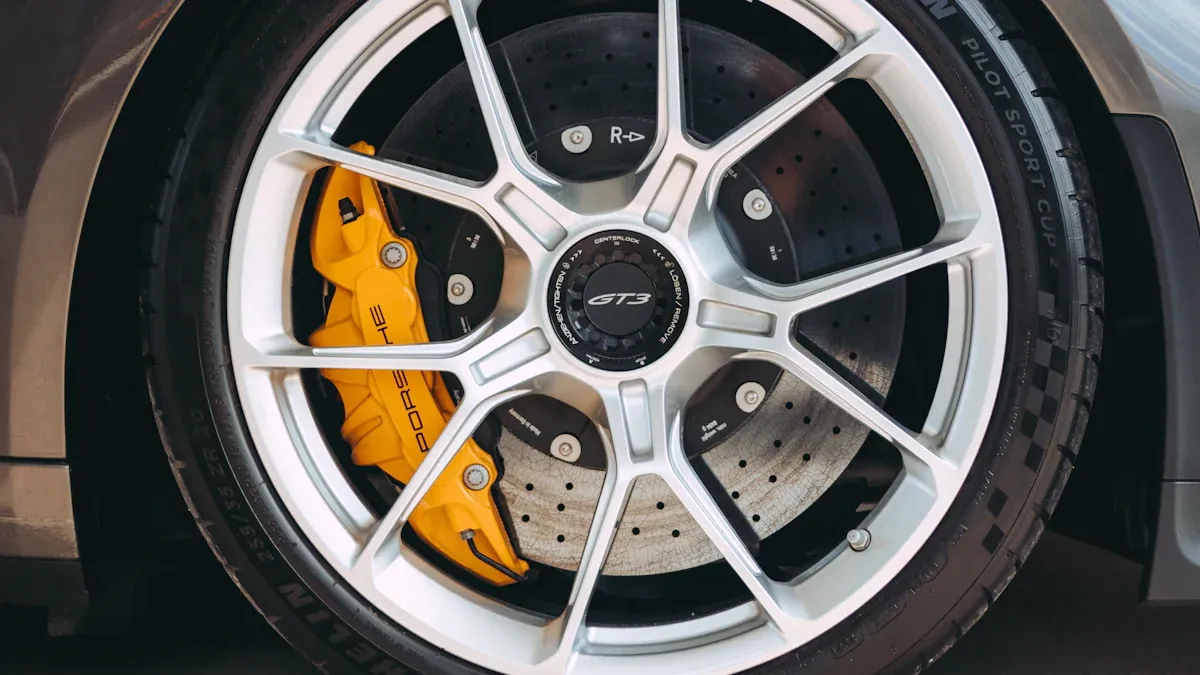
Steel wheel weights offer unmatched durability and cost-efficiency, making them indispensable in the automotive industry. In North America, light trucks account for roughly 80% of vehicle sales, demonstrating the reliance on heavier steel wheel weights for robust performance. Similarly, China’s production of over 27 million vehicles in 2022 underscores the demand for cost-effective solutions like steel wheel weights. Their lighter construction enhances vehicle handling in challenging conditions. Improved corrosion resistance and pothole durability ensure reliable performance on rough terrains and snowy roads. Steel wheel weights are not only practical but also align with sustainability trends, as the global steel recycling market reached USD 290 billion in 2022.
Features of Steel Wheel Weights

Material Composition
Steel wheel weights are crafted from high-quality steel, a material renowned for its exceptional strength and resistance to wear. Unlike alternative materials, steel offers superior corrosion resistance, making it ideal for long-term use in various environments. Regulatory restrictions on lead have further elevated steel as the preferred choice for wheel weights due to its environmentally friendly properties.
| Material | Advantages | Environmental Impact |
|---|---|---|
| Steel | Durability, corrosion resistance | Preferred due to regulations against lead |
The combination of durability and eco-friendliness ensures that steel wheel weights meet both performance and sustainability standards. This makes them a reliable option for vehicles operating in challenging conditions.
Weight Characteristics
Steel wheel weights strike a balance between functionality and practicality. Their weight distribution enhances vehicle stability, ensuring smooth handling even on rough terrains. While steel is heavier than some alternatives, this added weight contributes to better traction and control, especially in adverse conditions like snow or mud.
| Material | Cost-effectiveness | Longevity | Performance |
|---|---|---|---|
| Steel | High | Excellent | Consistent |
This consistency in performance makes steel wheels a dependable choice for drivers seeking reliability and safety.
Structural Integrity
The structural integrity of steel wheel weights is unmatched. Rigorous engineering tests, such as impact testing and dynamic loading, confirm their ability to withstand sudden forces and varying loads over time. Stress fatigue testing further demonstrates their durability under repeated stress cycles, ensuring long-lasting performance.
| Test Type | Purpose |
|---|---|
| Impact Testing | Assesses the ability to withstand sudden forces without failure. |
| Dynamic Loading | Evaluates performance under varying loads over time. |
| Stress Fatigue Testing | Determines durability under repeated stress cycles. |
- ASTM A615 standards include deformation, tension, and bend tests, ensuring steel’s strength and flexibility. These properties make steel wheel weights a robust solution for demanding applications.
Steel wheels excel in durability and structural reliability, making them a top choice for vehicles that face tough driving conditions.
Benefits of Steel Wheel Weights
Durability and Longevity
Steel wheel weights are designed to endure the toughest conditions. Their exceptional durability ensures they can handle high torque and heavy loads without bending or cracking. This makes them a reliable choice for vehicles that frequently encounter rough terrains or extreme driving environments. Unlike other materials, steel wheels maintain their structural integrity over time, reducing the risk of failure during operation.
The longevity of steel wheel weights has been proven through rigorous testing. For example, forged steel wheels are 20-30% stronger than cast alternatives, allowing them to withstand higher stress levels. In racing and off-road scenarios, they resist extreme speeds and cornering forces, minimizing the likelihood of damage. The table below highlights key performance metrics that demonstrate their durability:
| Metric/Case Study | Description |
|---|---|
| Strength | Forged wheels are 20-30% stronger than cast wheels, managing higher torque and loads without bending or cracking. |
| Durability | In racing and off-road settings, forged wheels resist extreme speeds and cornering forces, reducing wheel failure risk. |
| Weight Reduction | The reduction in unsprung weight enhances acceleration and improves braking distances, contributing to better vehicle dynamics. |
This combination of strength and durability ensures that steel wheel weights deliver long-term value for your vehicle.
Cost-Effectiveness
Steel wheel weights offer unmatched value for their price. Their affordability makes them an attractive option for both individual drivers and commercial fleet operators. Compared to alternatives like aluminum, steel provides a cost-effective solution without compromising on performance. The initial investment in steel wheels is lower, and their long lifespan reduces the need for frequent replacements, saving you money in the long run.
Additionally, steel wheel weights are widely available, which helps keep their costs competitive. Their durability also minimizes repair expenses, further enhancing their overall value. For those seeking a balance between quality and affordability, steel wheel weights are an excellent choice.
Repairability and Maintenance
Steel wheel weights are not only durable but also easy to repair and maintain. If they sustain damage, you can often restore them to their original condition without incurring significant costs. This repairability adds to their overall value, making them a practical option for vehicles exposed to challenging conditions.
Maintenance is straightforward as well. Steel wheels resist corrosion better than many other materials, especially when treated with protective coatings. Regular cleaning and inspection can help you maintain their appearance and functionality for years. This ease of maintenance ensures that steel wheel weights remain a dependable and cost-effective solution for your vehicle.
Performance in Adverse Conditions
Steel wheel weights excel in adverse conditions, offering unmatched reliability and stability when you need it most. Whether you’re navigating icy roads, muddy trails, or uneven terrain, their performance characteristics ensure your vehicle remains safe and efficient.
Superior Traction in Extreme Weather
Steel wheel weights enhance your vehicle’s traction, especially in snow, rain, or mud. Their weight distribution improves tire grip, reducing the risk of skidding or losing control. For example, in snowy conditions, the added weight helps tires maintain better contact with the road surface, ensuring smoother handling and safer driving. This makes steel wheel weights an ideal choice for winter driving or regions prone to harsh weather.
Tip: Regularly inspect your steel wheel weights during winter months to ensure they remain securely attached and free from debris.
Resilience Against Rough Terrains
When driving on rocky or uneven surfaces, steel wheel weights demonstrate exceptional durability. Their robust construction withstands impacts from potholes, gravel, and other obstacles that could damage lighter materials. This resilience ensures consistent performance, even in the most demanding environments. For off-road enthusiasts or commercial vehicles operating in rugged areas, steel wheel weights provide the reliability you need to tackle any challenge.
Corrosion Resistance for Longevity
Adverse conditions often expose your vehicle to moisture, salt, and other corrosive elements. Steel wheel weights, especially those treated with protective coatings, resist corrosion effectively. This resistance extends their lifespan and ensures they maintain their structural integrity over time. By choosing steel wheel weights, you invest in a solution that performs reliably, even in environments that accelerate wear and tear.
Consistent Performance Under Stress
Steel wheel weights maintain their performance characteristics under high stress. Whether you’re hauling heavy loads or driving at high speeds, they resist deformation and maintain balance. This consistency enhances vehicle stability, reduces vibrations, and improves overall handling. For commercial vehicles or those frequently subjected to demanding conditions, steel wheel weights deliver dependable performance.
Note: Proper maintenance, such as cleaning and inspecting your steel wheel weights, can further enhance their performance in challenging conditions.
Steel wheel weights stand out as a reliable and durable option for vehicles operating in adverse conditions. Their ability to provide superior traction, resist damage, and maintain consistent performance makes them an essential component for safe and efficient driving.
Applications of Steel Wheel Weights
Use in Commercial Vehicles
Steel wheel weights play a vital role in ensuring the safety and efficiency of commercial vehicles. These vehicles often carry heavy loads, making proper weight distribution essential for optimal performance. High-quality steel wheels help balance the tires, reducing uneven wear and extending tire life. This directly lowers operational costs for fleet operators by minimizing the frequency of tire replacements.
Balanced wheels also improve fuel efficiency, which is a critical factor for commercial fleets. By reducing rolling resistance, steel wheel weights contribute to better mileage, helping you save on fuel expenses. Additionally, they enhance vehicle stability, reducing the risk of accidents caused by improper weight distribution. Studies show that over 25% of accidents involving heavy-duty trucks are linked to substandard wheel weight products. Choosing reliable steel wheel weights ensures your fleet operates safely and efficiently.
Winter Driving and Snowy Conditions
Winter driving presents unique challenges, but steel wheel weights excel in these conditions. Their robust construction provides the necessary weight to improve traction on icy or snowy roads. This added grip helps your tires maintain contact with the road, reducing the likelihood of skidding or losing control. For drivers in regions with harsh winters, steel wheels offer unmatched reliability.
Steel wheel weights also resist corrosion caused by road salt and moisture, ensuring they remain functional throughout the season. Treated with protective coatings, they maintain their structural integrity even in the most demanding winter environments. Regular inspection and maintenance can further enhance their performance, keeping you safe during winter travel.
Performance on Rough Terrains
Rough terrains demand durable and reliable components, and steel wheel weights deliver on both fronts. Whether you’re navigating gravel roads, rocky trails, or uneven surfaces, their sturdy design withstands impacts that could damage lighter materials. This durability ensures consistent performance, even in the harshest environments.
Steel wheels also improve vehicle handling on rough terrains by providing better weight distribution. This enhances stability and reduces vibrations, making your driving experience smoother and safer. For off-road enthusiasts and commercial vehicles operating in rugged areas, steel wheel weights are an indispensable choice.
Aluminum vs Steel Wheels
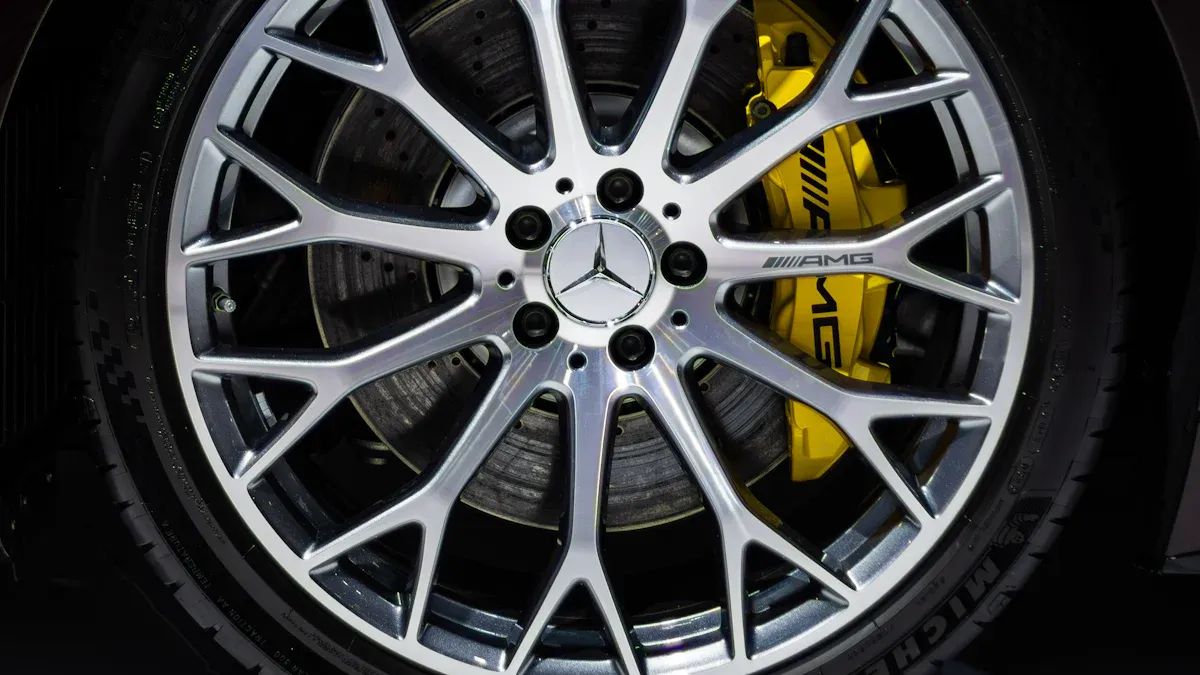
Weight Differences
When comparing aluminum and steel wheels, the weight difference becomes a significant factor in their performance and application. Steel wheels are heavier, with an average weight of 78 lbs, while aluminum wheels weigh around 47 lbs. This 30-lb difference can greatly influence how a vehicle handles and performs.
| Wheel Type | Average Weight (lbs) | Weight Difference (lbs) |
|---|---|---|
| Steel | 78 | 30 |
| Aluminum | 47 | – |
Steel wheels are approximately 2.5 to 3 times heavier than aluminum wheels of the same size. This added weight can negatively impact acceleration and deceleration, as the vehicle requires more energy to move and stop. Heavier wheels also reduce fuel economy, which is a critical consideration for both individual drivers and commercial fleets.
For instance, an Alcoa forged aluminum 22.5” x 8.25” hub piloted wheel weighs just 39 lbs, whereas an equivalent steel wheel weighs between 68 to 82 lbs. This significant weight reduction not only improves fuel efficiency but also allows vehicles to carry larger payloads. If you prioritize fuel savings and payload capacity, aluminum wheels may seem like the better choice. However, steel wheels offer other advantages that make them indispensable in specific scenarios.
Cost Comparison
Cost is another critical factor when choosing between aluminum and steel wheels. Steel wheels are generally more affordable, making them an attractive option for budget-conscious buyers. Their lower production costs and widespread availability contribute to their competitive pricing. For commercial fleet operators managing multiple vehicles, the cost savings from choosing steel wheels can be substantial.
Aluminum wheels, on the other hand, come with a higher upfront cost due to their manufacturing process and material properties. Forged aluminum wheels, for example, require advanced techniques to achieve their lightweight and durable structure. While the initial investment is higher, aluminum wheels can offer long-term savings through improved fuel efficiency and reduced wear on other vehicle components.
If you’re looking for a cost-effective solution without compromising on durability, steel wheels remain a reliable choice. Their affordability and long lifespan make them a practical option for vehicles operating in challenging conditions.
Durability and Repairability
Durability is where steel wheels truly shine. Their robust construction allows them to withstand harsh conditions, including rough terrains, heavy loads, and extreme weather. Steel wheels are less likely to crack or deform under stress, making them ideal for commercial vehicles and off-road applications. This durability ensures that steel wheels maintain their structural integrity over time, reducing the need for frequent replacements.
Aluminum wheels, while lighter, are more prone to damage from impacts. They can crack or bend under high stress, which may require costly repairs or replacements. Steel wheels, on the other hand, are easier to repair. Minor damages, such as bends, can often be fixed without replacing the entire wheel. This repairability adds to their overall value, especially for vehicles exposed to demanding environments.
When comparing the durability of these two types of wheels, steel wheels offer unmatched reliability. Their ability to endure tough conditions and their ease of repair make them a preferred choice for drivers seeking long-term performance and cost savings.
Tip: If your vehicle frequently encounters rough terrains or heavy loads, steel wheels provide the durability and repairability you need for consistent performance.
Performance Analysis
When evaluating the performance of steel wheel weights against aluminum wheels, it becomes clear that each material excels in specific conditions. However, steel wheel weights consistently demonstrate superior reliability in demanding environments, making them a preferred choice for challenging applications.
Comparative Performance in Various Conditions
Steel wheel weights outperform aluminum wheels in several key scenarios. Their robust construction ensures durability and stability, especially in adverse conditions. The table below highlights how each material performs under different circumstances:
| Condition | Aluminum Performance | Steel Performance |
|---|---|---|
| Winter | Good with care | Excellent |
| Rain | Excellent | Very Good |
| Off-road | Good | Excellent |
| Track | Excellent | Fair |
In winter, steel wheel weights provide unmatched traction and corrosion resistance, ensuring safe and efficient driving on icy roads. Aluminum wheels, while lighter, require extra care to avoid damage from road salt and freezing temperatures. Similarly, off-road conditions demand the resilience of steel, as it withstands impacts from rocks and uneven surfaces better than aluminum.
Stability and Handling
Steel wheel weights enhance vehicle stability by distributing weight evenly across the tires. This balance improves handling, especially in rough terrains or during heavy loads. While aluminum wheels offer better acceleration due to their lighter weight, steel wheels excel in maintaining control and reducing vibrations. For commercial vehicles or off-road enthusiasts, this stability is crucial for safety and performance.
Longevity Under Stress
Steel wheel weights maintain their structural integrity under high stress, such as heavy loads or extreme weather. Their ability to resist deformation ensures consistent performance over time. Aluminum wheels, though lighter, are more prone to bending or cracking under similar conditions. This makes steel a more reliable option for vehicles operating in harsh environments.
Practical Applications
The choice between aluminum vs steel wheels often depends on your specific needs. If you prioritize durability and reliability in adverse conditions, steel wheel weights are the clear winner. Their ability to perform consistently in winter, rain, and off-road scenarios makes them an indispensable component for vehicles facing tough challenges.
Tip: Regular maintenance, such as cleaning and inspecting your steel wheel weights, can further enhance their performance and extend their lifespan.
Steel wheel weights deliver exceptional performance in demanding conditions, offering durability, stability, and reliability. Whether you’re navigating snowy roads, rocky trails, or carrying heavy loads, steel remains a dependable choice for your vehicle.
Steel wheel weights stand out as a reliable solution for vehicles operating in demanding conditions. Their unmatched durability ensures long-term performance, even on rough terrains or in harsh weather. You’ll find them especially valuable for commercial vehicles and winter driving, where safety and efficiency are critical. Their cost-effectiveness makes them an excellent choice for balancing performance and affordability. By choosing steel wheel weights, you invest in a product that delivers consistent results and peace of mind.
FAQ
What makes steel wheel weights better than other materials?
Steel wheel weights excel in durability, cost-effectiveness, and performance under tough conditions. They resist corrosion, handle heavy loads, and maintain balance on rough terrains. Their affordability and long lifespan make them a practical choice for both personal and commercial vehicles.
Are steel wheel weights suitable for winter driving?
Yes, steel wheel weights perform exceptionally well in winter. Their added weight improves tire traction on icy or snowy roads. Protective coatings prevent corrosion from road salt, ensuring reliable performance throughout harsh winter conditions.
Tip: Inspect your steel wheel weights regularly during winter to ensure they remain securely attached and free from debris.
How do steel wheel weights impact fuel efficiency?
Steel wheel weights are heavier than aluminum alternatives, which can slightly reduce fuel efficiency. However, their durability and ability to maintain proper tire balance offset this by reducing tire wear and improving overall vehicle stability.
Can steel wheel weights be repaired if damaged?
Yes, steel wheel weights are highly repairable. Minor damages, such as bends, can often be fixed without replacing the entire weight. This repairability adds to their value, especially for vehicles exposed to challenging conditions.
Are steel wheel weights environmentally friendly?
Steel wheel weights are eco-friendly due to their recyclability. Unlike lead-based weights, steel complies with environmental regulations and contributes to sustainability efforts. The global steel recycling market supports their reuse, reducing waste and conserving resources.
Note: Choosing steel wheel weights helps you align with environmentally responsible practices.
